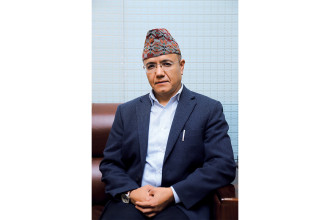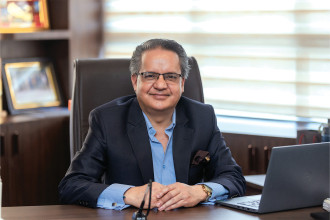
Managing Director of Hilife Foods, Prashant Ghimire recalls his childhood being unlike that of most of his friends. And unlike his friends, he never had a career aim while growing up except that problem solving excited him. “Since childhood, I loved dissecting things and reorganising them in a better way. Identifying problems, solving them and selling solutions interested me most. Perhaps that’s the reason my hobbies since I was 12 were coding, puzzle-solving and DIY electronics,” he explains.
Although Ghimire was mostly just above average in academics, he quit his formal education after SLC and started self-learning on topics that truly interested him. “I had already started earning since I was in grade 6 by selling handy computer programs I made for school attendance and payroll management to nearby businesses. Also I never had problems or pressure from my family when I told them that I would not be going to college; they knew I’d do better,” he states.
Ghimire’s father was happy to engage him in his business, a thread spinning factory which employed about 50 people almost 15 years ago. He spent two years working with his father getting first-hand experience about how the market works. He would visit different parts of the country with the marketing staff. “I also often travelled with my dad to visit vendors in India. Such exposure at an early age helped shape what I am doing now.” Hilife Foods was established in 2019 with an aim to provide safe and hygienic food and snacks to the consumers at affordable prices. In a short period of time, it is already being recognized as an established brand largely due to its focused marketing and branding strategizes besides the quality it offers consumers.
Excerpts of an interview with Dibesh Dangol of B360 on what leadership means to Prashant Ghimire:

How do you define leadership?
The ability to make decisions that yield long-term benefits to maximum stakeholders and willingness to take responsibility for the same is how I understand the term, leadership. Further, leadership for me is not just limited to commanding a small group or a company; instead it should include the whole industry involved.Whose leadership skills inspire you?
I am inspired by the way spiritual gurus - not religious - lead. I find a lot of things to learn in them. Selflessness is the quality I seek in a leader.Is leadership inborn or acquired?
It certainly is acquired. I don’t believe in inborn intellectual qualities. One who accepts change and adapts as per situation throughout life is the one who succeeds. A good leader should always be willing to learn and adapt to best practices. This is something that has to be acquired through vigorous learning and experience.
What are the most important values a leader should demonstrate?
Selflessness. A leader must make decisions yielding long term benefits to maximum stakeholders. Even if at times people who are close and dear to you may be hurt in the short-term when a leader plans something big. A prominent leader must always make an appropriate decision regardless of himself and should show-case confidence in it.What is the biggest challenge you have encountered?
Fortunately there has not been a situation in Hilife Foods to date where I have had to implement Plan B. We have just started and I am sure we’ll have to face many tough situations in the future. Various problems keep on arising from time to time. That’s very obvious when you’re leading a large number of people and working nation-wide. Amongst them, the toughest I find dealing with is handling change-reluctant people. Most times, I am the youngest one in the meeting room and that certainly has its perks but rarely it’s the only thing that keeps me from being heard. I am wise enough to accept things I cannot change and move on with patience. This being the rare occurrence, my constant challenges at work are keeping up with the market competition when there are lots of ‘big players’ and managing them fairly. Moreover, betting in a highly volatile market like Nepal is always challenging in one way or the other.How should a leader lead through change?
It depends upon the change. A leader should have the wisdom to differentiate between changes. Some changes are for better and some not quite. A leader should play a fair and decisive role in differentiating between the changes. He should be adaptive towards those where the good outweighs the bad. Identification and implementation are the key role leaders have to play through change.Have you ever struggled with work-life balance?
For me, work and life aren’t different. Most of my time is filled with work related activities. I thoroughly enjoy it. It’s like sports to me. It is as important as my family and personal life. Perhaps, it is so because all of my family members are engaged with me at work too. Most of our business tours are family tours too. I guess I am blessed in this regard.What difference do you see between the current generation of entrepreneurs and those of the previous generation?
The primary difference I see in the current generation and the previous generation is the ability to adapt to change. Thanks to advancement in IT, now we have all information at our fingertips. The methods of risk evaluation are more accessible. This has allowed us to take calculated risks. Further, the tools for scalability are easily available now than before. This whole scenario has adapted to positive change much faster and is convenient for entrepreneurs which of course was very different than in the past.How do you encourage the development of your employees?
It’s a fact that organisational success is the collective effort of a well led team. I believe self motivation is the only thing that works in the long run. I focus on things that trigger self motivation among employees when it comes to encouraging them. We have arrays of perks and various benefits distributed among all employees on merit basis. Most importantly, I put human values and ethics at the forefront when it comes to dealing with our employees. We have enough room for mistakes but almost none for recurring ones. This opens doors for the hidden talents to show up and foster.How can the leadership in any organisation ensure equality amongst its employees?
I believe equality amongst employees in the workplace does not necessarily mean equal treatment. Instead it has more to do with fair treatment. To ensure equality amongst employees, leadership has to work on two major points: Inclusiveness and Transparency. Leadership must be careful while drafting policies that don’t discriminate employees based on their gender, race, disability, religion, nationality, sexual orientation or age. Instead of being selective based on these categories, a leader must prioritise on diversified recruitment. Valuing the differences between people and emphasising each one’s pros can excel the overall productivity. Maintaining fair enough transparency is another important factor that helps ensure equality at the workplace. Promotion should always be on merit basis, maintaining a proper track record of employees, publishing them and promoting them based on those records can help to a greater extent in this regard. Further, leadership can focus on boosting collaboration among employees by prioritising team work instead of individual assignments. Review and evaluation of organisational policies and practices including managing performance, career progression, perks and rewards; training and development are required frequently. These can support and demonstrate the inclusiveness and transparency of leadership inside any organisation.
Published Date: October 13, 2020, 12:00 am
Post Comment
E-Magazine
RELATED Leadership




-(1)-1752214965.jpg)